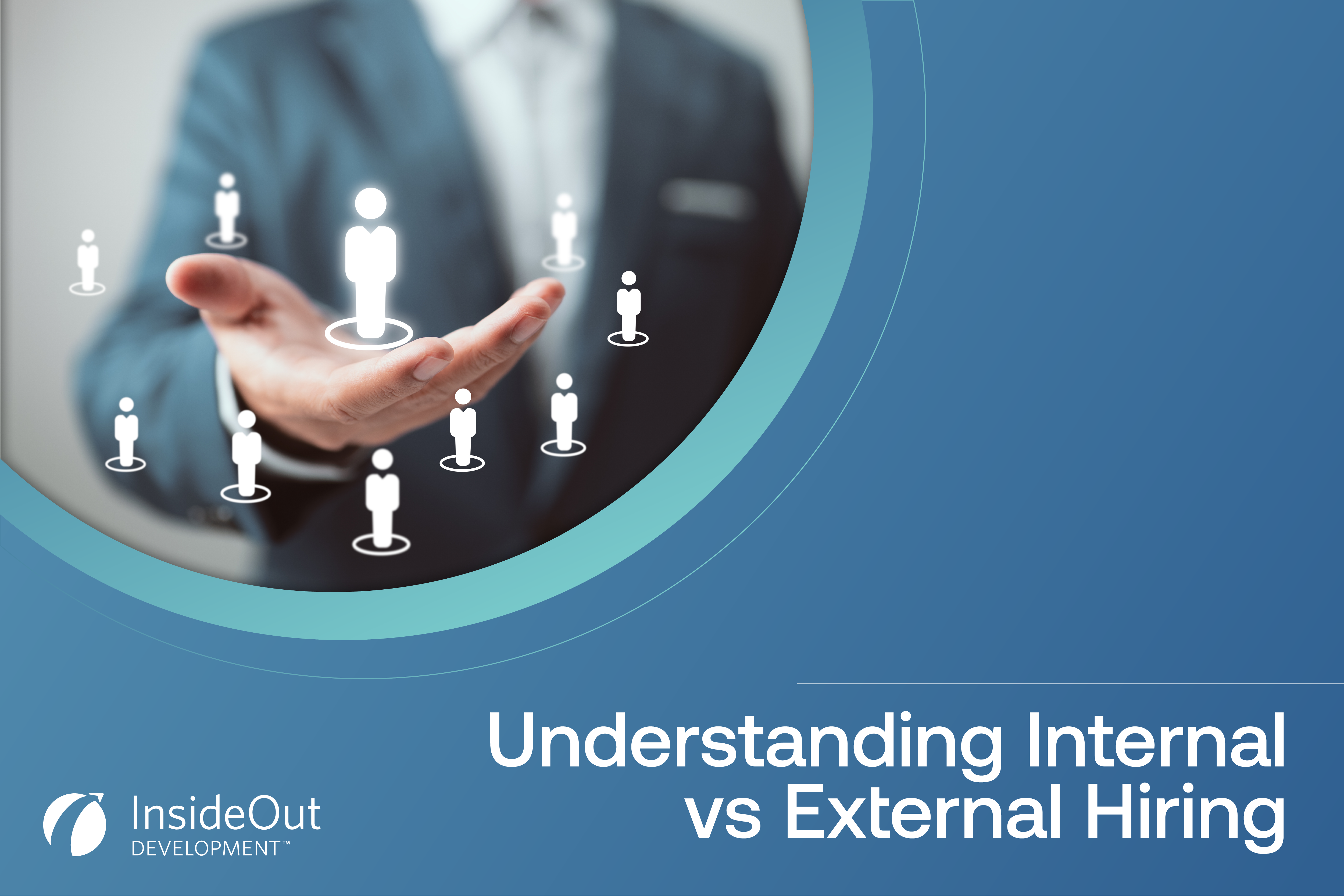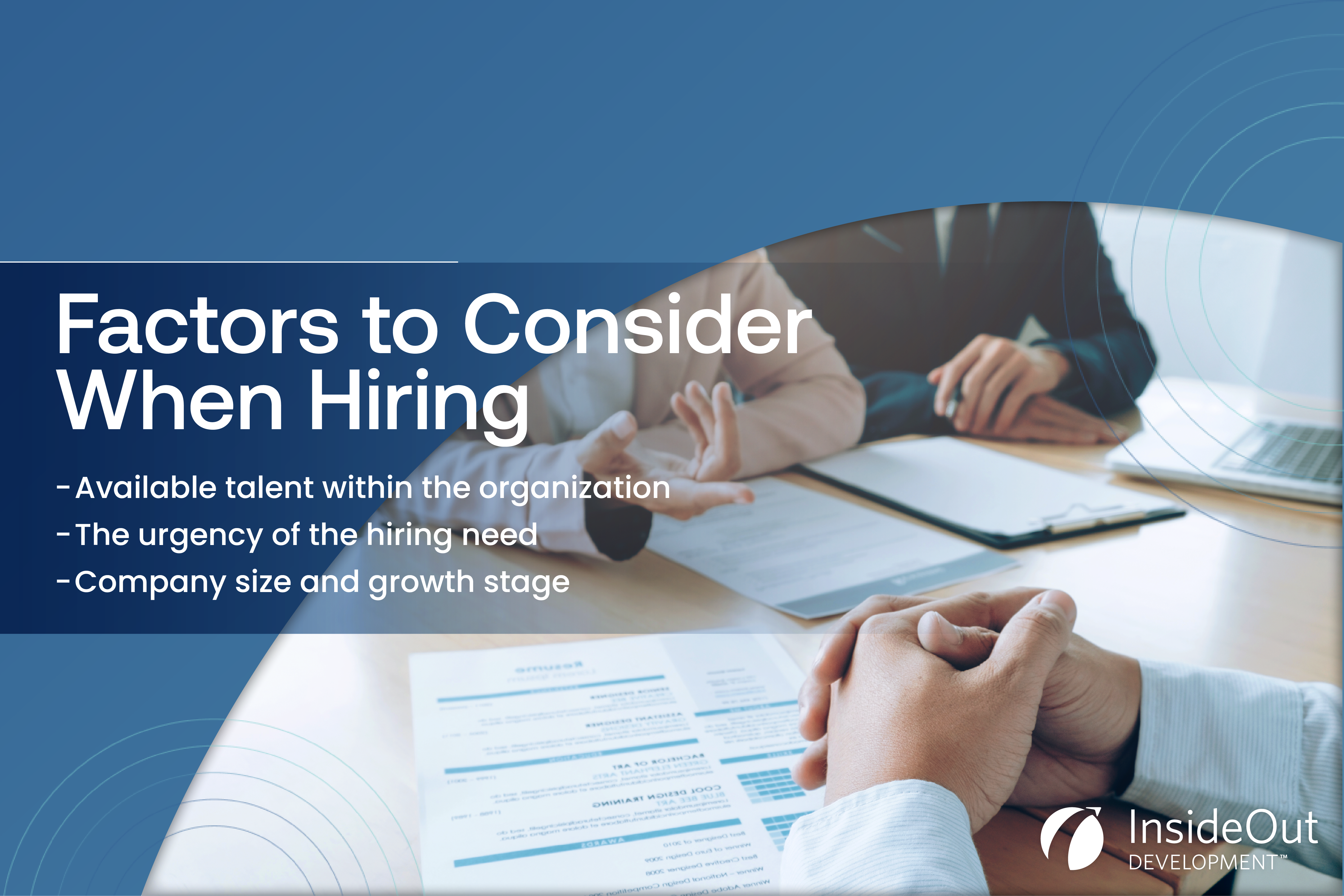A company is only as good as the people who work there, so finding the right talent is a high priority for all organizations. Hiring a candidate with the right skills, experience, and personality can be costly and time-consuming, particularly when seeking candidates to fill higher-level positions.
Organizations looking to hire should consider their needs, goals, budget, and timeline before beginning recruitment. With a detailed plan and a thorough understanding of the available options, companies can find the right talent at the right time.
Understanding Internal vs External Hiring
 When a company seeks to fill a role, it can draw from two main talent pools.
When a company seeks to fill a role, it can draw from two main talent pools.
Internal recruitment focuses on existing company employees with a proven history of success who are ready to move forward and take on new career challenges.
Conversely, external hiring focuses on bringing in fresh, outside talent who can provide new skills and perspectives. There are both advantages and disadvantages to hiring internal vs external candidates. Most businesses find a balanced approach gives the best overall results.
Benefits of Hiring Internally
 Promoting within the existing company talent pool provides fiscal, motivational, and productivity benefits.
Promoting within the existing company talent pool provides fiscal, motivational, and productivity benefits.
Employees hired from within already understand and align with company values. This familiarity reduces cultural onboarding needs and creates a smooth transition for the team or department affected.
Internal recruitment also saves time and money. Training expenses are generally lower, and employees hired internally often begin meeting productivity goals more quickly. It can also reduce recruitment time, negating the need for extensive interviews, job board postings, and additional expenses like relocation bonuses or background checks.
One of the most underrated benefits of hiring internal candidates is boosting employee morale and motivation. Internal hiring encourages long-term career planning, strengthens loyalty, and helps employees envision a future with the company.
Potential Downsides of Internal Recruitment
Internal recruitment can have its disadvantages. Relying exclusively on internal hiring can limit fresh perspectives, increasing the likelihood of stagnation and resistance to change within the organization.
Promotion from within also means filling the vacancy a promoted employee leaves, putting additional pressure on the human resources (HR) department to fill multiple roles quickly.
Internal candidates moving up from a different role may also lack the relevant skills or experience that an external candidate may bring to a position. In the long term, this can cause challenges in succession planning when the company needs to fill higher-level roles.
Benefits of Hiring Externally
Hiring external candidates also has many potential advantages. An excellent external candidate may bring specific qualifications or expertise to help a company or department that is transitioning or looking to expand. External hires also offer fresh perspectives and insights into problems that may go unnoticed or unrecognized.
To continue, external recruitment gives the company a larger talent pool to choose from. The larger playing field allows recruiters to look for candidates with specific skills and experiences, making it easier to diversify the workforce.
While internal hiring can boost employee morale, it can also have the opposite effect. Employees passed over for a promotion in favor of a coworker often leave shortly after that. Bringing in an external hire can reduce issues caused by internal politics, like biases or favoritism.
Potential Disadvantages of External Hiring
While often an essential source of growth, external hiring can have disadvantages. Recruiting costs are higher due to sourcing, interviewing, and onboarding expenses. The additional expenses can negatively impact a departmental budget if not adequately planned for.
The onboarding for external hires also tends to be longer as they work to adapt to their new role and company. Adjusting to a new organizational culture can be difficult; some clashes are natural during any transition. Even the best new hires may need help integrating with existing teams early on.
When to Choose Internal vs External Hiring
 When hiring externally vs internally, most companies take a balanced approach, making a choice that best suits their needs at that moment for that specific role. There are a variety of factors that can impact this decision, including:
When hiring externally vs internally, most companies take a balanced approach, making a choice that best suits their needs at that moment for that specific role. There are a variety of factors that can impact this decision, including:
- Company size and growth stage: Companies should consider their current size and growth goals when considering internal hiring vs external hiring. Are stability and continuity more in line with current goals? Or are growth and expansion currently more important?
- The urgency of the hiring need: When a key role becomes vacant suddenly, it may be necessary to emphasize speed during the hiring process. Promoting from within saves time during both interviewing and onboarding.
- Available talent within the organization: In companies with a large talent pool where there may be multiple good candidates available to fill a vacancy, many of the potential cons of internal hiring become a non-issue. In smaller organizations, where options are more limited, new talent may be necessary to find the right balance of skills and experience for the position.
Individual circumstances play a huge role in determining where a company looks for potential candidates.
For example, an organization looking to grow and expand would likely prioritize bringing in additional talent, whereas a company going through significant upheaval might want the speed and stability offered by promoting a known and trusted individual.
Companies with a strong coaching culture also tend to emphasize internal promotion. When coaching is already a foundational element of organizational culture, it mitigates or eliminates many potential downsides of internal hiring.
Organizations with coaching cultures focus heavily on communication and long-term growth as key elements of employee satisfaction, productivity, and loyalty. This environment creates a unique opportunity for companies to reap the rewards of internal hiring while negating some of the more common downsides.
Take a Balanced Approach to Hiring
In the debate of external vs internal hiring, there is no one correct answer — only the answer that is right for that specific company at that particular moment.
Both internal and external recruitment come with unique benefits and problems. Internal hiring is fast, low-cost, and promotes stability and loyalty. External hiring opens opportunities for diversity, growth, and fresh ideas.
By carefully assessing their organizational needs and goals, and prioritizing ongoing coaching, companies can choose the strategy and candidate that are right for them.
Learn more about creating a coaching culture in our free eBook.{{cta(‘1131a5bd-a246-445d-bf3f-4fa2cbe82979′,’justifycenter’)}}


